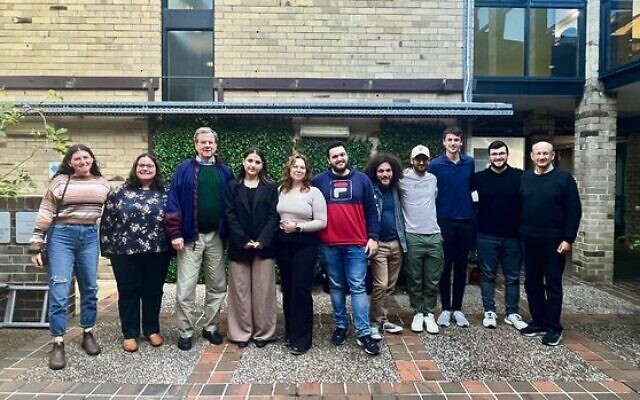World renowned leader inspires
American Jewish Committee (AJC) CEO David Harris was in Sydney late last month, meeting current and future leaders of the Jewish community.
Australasian Union of Jewish Students (AUJS) leaders had the opportunity to sit down with American Jewish Committee (AJC) CEO David Harris during his trip to Sydney as a guest of the Australia/Israel & Jewish Affairs Council (AIJAC) late last month.
Harris has spent 30 years at the helm of the AJC and was described by the late Israeli president Shimon Peres as “foreign minister of the Jewish people”.
AUJS spent the afternoon hearing about his experiences as a global Jewish advocate and some of the lessons he has learnt along the way. The group discussed the Jewish experience on campus in Australia and spoke about what it means to be proud and resilient Jews in increasingly hostile spaces.
AUJS vice-president Alissa Foster said, “After three years of being physically isolated from the global Jewish community, it was a great honour to have David Harris meet our student leaders here in Sydney.
“Words cannot describe the work he has done advocating for the Jewish people, and it was so inspiring to have him answer our questions and listen to our experiences.”
It was my pleasure, @AUJS.
L’dor v’dor. From generation to generation.
The future of Australia’s great Jewish community is in the best of hands.
How do I know? I met some of those leaders here in Sydney.
They’re bright. They’re proud. They’re dedicated. They’re passionate. https://t.co/473Jh2zrrO pic.twitter.com/ecHymclToG
— David Harris (@DavidHarrisAJC) July 24, 2022
After the meeting, Harris tweeted, “The future of Australia’s great Jewish community is in the best of hands. How do I know? I met some of those leaders here in Sydney. They’re bright. They’re proud. They’re dedicated. They’re passionate.”
Meanwhile in a wide ranging presentation to AIJAC supporters at a boardroom lunch, he addressed the problems facing the American Jewish community, both internally and externally; the enormous achievement of the Abraham Accords and the complex question of the relationship of Saudi Arabia to Israel and the Jewish people; the way in which Iran has “played its hands brilliantly” to undermine the global ability to restrict development of weapons of mass destruction and the development of an international terrorist network; the failure of the world to engage with the issue of Jewish refugees from the Middle East and North Africa while romanticising and contributing to the lack of progress regarding Palestinian refugees; and US/Israel relations, both now and looking at future scenarios.
He stressed also that “we cannot afford to lose in Ukraine” noting that this situation was being closely watched by both the enemies of liberal democracy and by states which have depended on defensive alliances with the West.
During his brief visit, he also met a number of federal and state MPs, as well as media and civil society leaders.


comments